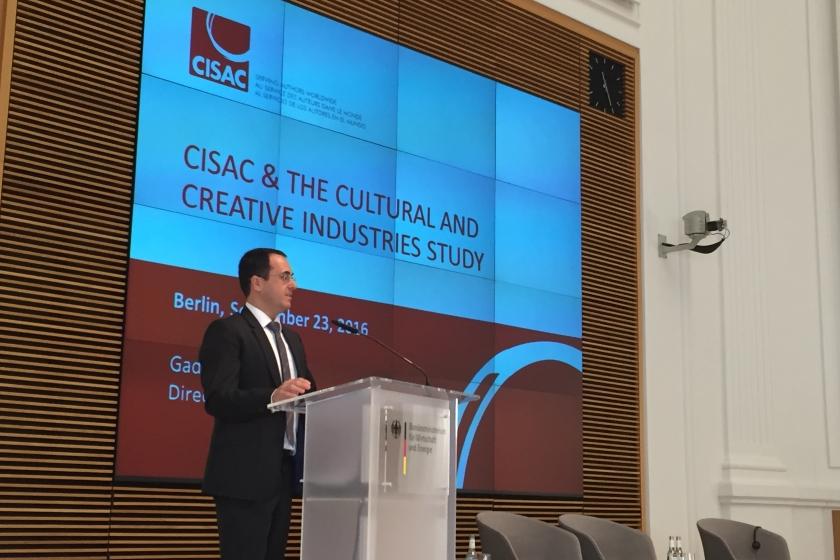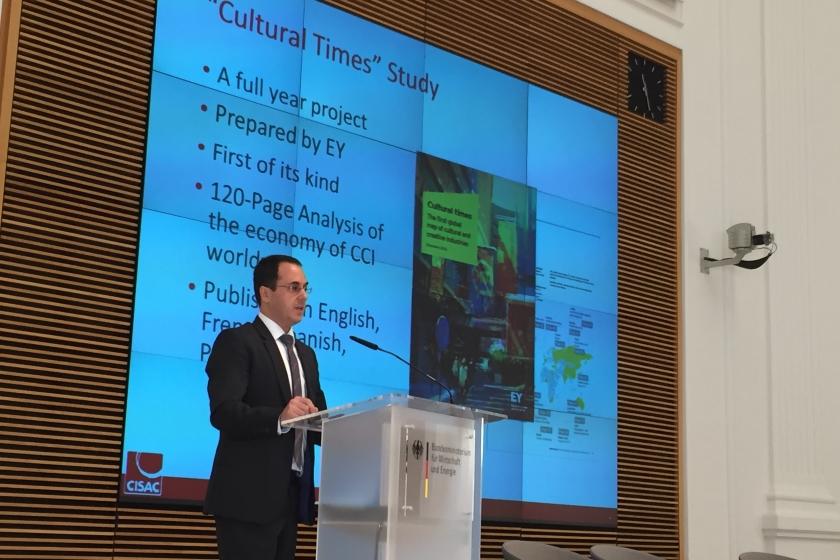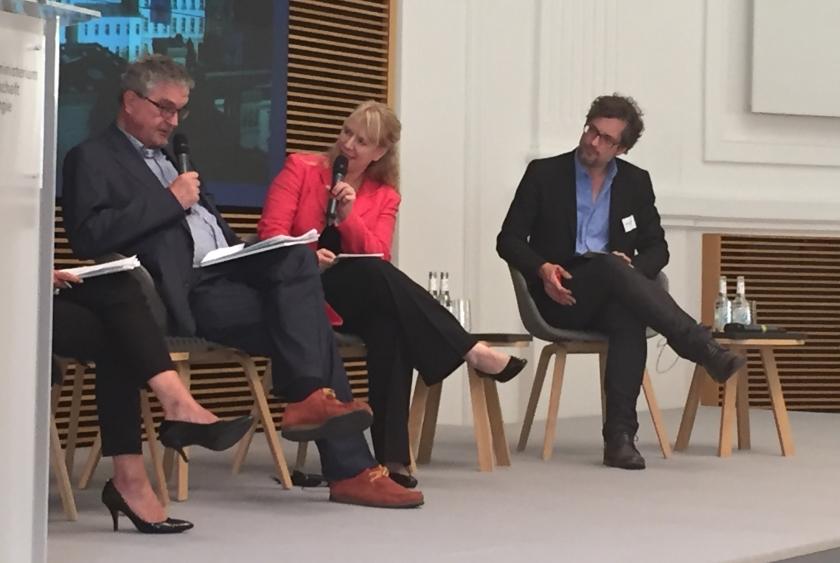CISAC Presents Landmark Cultural Times Study at 2016 Berlin Research Symposium on Cultural and Creative Industries

On 23 September, CISAC Director General Gadi Oron presented the results of the EY-prepared study “Cultural Times – The First Global Map of Cultural and Creative Industries” at the 2016 Berlin Research Symposium on Culture and Creative Industries (CCIs) upon the invitation by the German government and CISAC member society GEMA. Hosted by the Federal Government’s Centre for Excellence for the Cultural and Creative Industries as part of the Initiative for Cultural and Creative Industries at the Federal Ministry for Economic Affairs and Energy, the symposium united creative industry, media, economic and scientific experts and professionals.
The day was organised into two sections; theoretical concepts and reports in the morning with the effect on cultural industries in the afternoon. During opening remarks, cultural research expert Michael Söndermann declared, “Government needs scientific input when we have to make decisions.” He noted that CCIs are underestimated sectors with an importance that needs increased visibility and a strengthened international component. More specifically, he stated, “We need to establish a link between the creative industries and established sectors.” The Federal Commissioner for Culture and Media Head of Office Günter Winands then put protection to the centre of the discussion, particularly with the challenges of technology, saying, “What we can do is come up with the right framework to make sure that [creation] is possible and creators are remunerated the right way.”
When Söndermann introduced the agenda, he underscored the importance of CISAC’s fact-based study “in order to provide an impetus internationally”. The international confederation “shows that the developed and developing world are faced with the same challenges.”
Providing the global view, Gadi Oron addressed attendees by providing the economic evidence measured at a worldwide scale in the Cultural Times study. The 120-page study, launched in December 2015 at a press conference with UNESCO, established the data that explained the scope and value of the global creative industries. The results convey to policy-makers the importance of copyright-driven industries and the necessity to have strong laws to protect creation. Gadi Oron noted that in today’s challenging market conditions “a lot of value is captured by intermediaries but is not shared. In that context, it is important to show the economic importance of the creative sector, in order to promote supportive policies.”

Drawing the link regarding the economic benefit of CCIs, Gadi Oron underscored that “protecting creators is also about stimulating the economy” while drawing attention to the issue of transfer of value in the digital market and its negative effects. He declared, “We face powerful forces that constantly try to lower copyright protection to better serve their interests. … We are witnessing a systemic and coordinated attack on copyright and creators’ rights that are portrayed as a ‘hindrance to innovation’ when in reality, creation is innovation.”
Oron underscored that the nature of the study was unprecedented in scope, coverage, integration of “enormous amounts of data, with personal stories” and its attempt to estimate the impact of CCIs to the global economy for the first time. “The results of this research were astounding, with CCIs providing jobs for almost 30 million people while generating 2,215 billion euros in revenues. This study showed the direct correlation between copyright protection, CCIs and economic development as well as the necessity for legal frameworks to protect and support them. Doing so would build an environment where investors know they can invest in culture and receive a return on investment.”
Starting the panel discussion on the study’s implications in Germany, Cornelia Dümcke of Culture Concepts reinforced the presentation, “We have to establish a framework where the diversity of culture is preserved. … We have to overcome any inequality in the markets to establish a level playing field.” The conversation in Germany had overlooked the value of CCIs, yet this trend has reversed with a newfound economic focus on these industries in recent years. Andreas Johannes Wiesand of Cultural Compendium continued discussing protection of creators. He stated, “There is an unequal situation in regards to employees in these various areas of cultural industries. What we can learn from this is that the share of employees in precarious job situations is much higher as compared to the rest of society. This should be reason for us to work harder and to deal with this to find solutions.” Finally, composer Matthias Hornschuh brought up disruption in the industries, confirming that “Value is created but not fed back. We have to urgently act and create a regulatory framework. … We need to develop legal tools and instruments that go across boundaries.”

The presentation and panel discussion concluded with a Q&A session. During the session, several comments surrounded the surprise of learning that Asia-Pacific was measured as larger than Europe in size. In recent years, China had changed their approach to copyright protection after learning that the country has a local interest. Matthias Hornschuh reinforced China’s call to reinforce and protect domestic-produced creation. Andreas Johannes Wiesand echoed this, saying the “rethinking” process had taken place in the United States in the past.
Concluding, Gadi Oron provided attendees in Berlin with one key takeaway, “You see what supportive government legislation can do for the economics of cultural industries. When the government decides to support these industries, there are rewards not only in terms of culture, but also economic.”
Read the “Cultural Times – The First Global Map of Cultural and Creative Industries” study at worldcreative.org.
